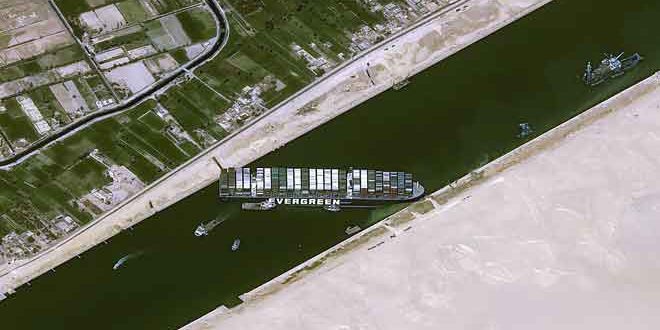The repercussions of the disruption of navigation in the Egyptian Suez Canal following the stranding of a giant container transport ship continue to affect the global economic and commercial situation.
The disruption of this vital waterway, which connects the Red and the Mediterranean seas, has serious impacts as it is the lung of global trade and the lifeline that connects the east and the West in the light of a global economic crises and high oil prices.
On Tuesday, the container ship “Ever Given”, a Japanese-owned huge ship operated by Taiwan got stuck in the Suez Canal because of strong wind and blocked the route. The blockage causes the suspension of daily trade exchange that is estimated at 9.6 billion US dollars, equivalent to 400 million US dollars per hour.
The Suez Canal stepped up efforts on Friday to free the stuck huge vessel, after an earlier attempt has failed to end the blockage.
“The disruption is massive,” said Guy Platten, secretary general of the International Chamber of Shipping (ICS) . “There are well over 200 ships waiting to use the canal and the number is growing and shipping companies are making that difficult decision whether to go around Africa,” he added, according to the Guardian newspaper.
About 12% of global trade passes through the Suez Canal, carrying well over $1tn worth of goods a year. About 50 ships a day, carrying a total of $3bn to $9bn worth of cargo, will make the journey north or south between Suez port and Port Said.
The beached Ever Given alone is carrying up to 20,000 containers; and in the queue behind it sit more than 16 fuel tankers.
Container ships now form the bulk of the traffic in Suez. This lengthy delay while the ship is being salvaged will hit supply chains and the mounting costs could inflate everything from oil prices to basic goods, some suggest.
Platten said: “Cargo will be late; the impact will ripple out to the rest of the world. Demand for ships will rise.”
Shipping is resilient, he said, but he added: “You miss your slot at a port, you can’t offload your cargo – your grain, iron ore, any matter of goods or commodities … some are time critical and could perish and affect whole supply chains. And some carry vital medical equipment – there will be disruption in the midterm.”
Platten played down fears that ultra-large container ships – some of which are already unable to navigate the other great passage, the Panama Canal – are apt to struggle, and that this was more than a freak event: “There are 18,000 transits every year … the last time it was blocked was 2013 and that was only for a few hours.”
According to shipping specialist Lloyd’s List Intelligence, 114 similar-size ships have made the same northbound journey up the canal to Europe already in 2021, without incident.
Hamda Mustafa

